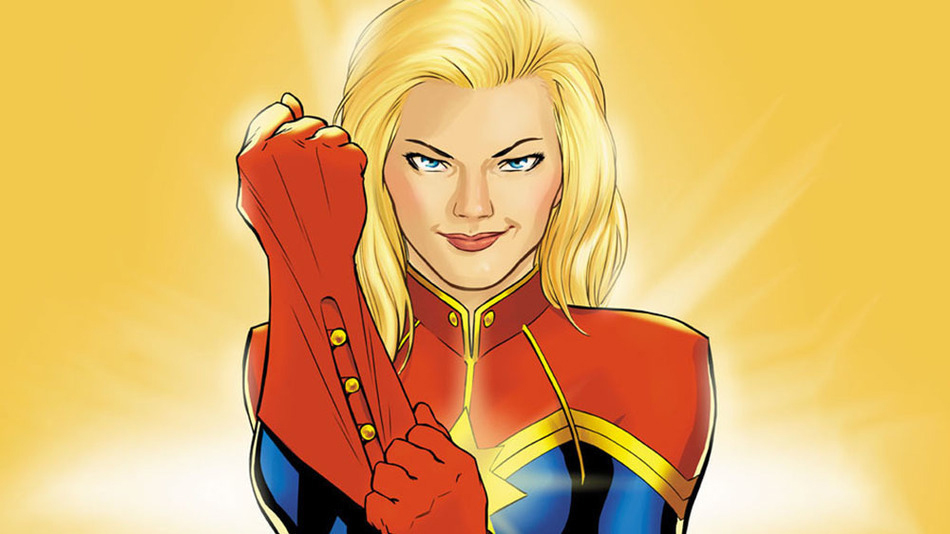
Diversity is even (finally) coming to the big screen; 2018’s Captain Marvel will be Marvel Entertainment’s “first female-driven superhero movie” (Image courtesy of Marvel Entertainment)
DESPITE POPULAR REPRESENTATION OF COMIC BOOKS as entertainment for boys 8-14 and men who live with their mothers, nearly half of all comic book readers are women. Mainstream publishers and creatives have been slow on the uptake, but comics in the U.S. today are more diverse than ever, and now is absolutely the time for women, LGBTQIA individuals, and members of ethnic minorities to become comic book readers, writers, and artists.
Diversity may finally be coming to major comic book worlds, but it has always existed in the underground. Among the more prominent — read: financially successful and critically-acclaimed — cartoonists out there are Alison Bechdel (Dykes to Watch Out For), Aaron McGruder (The Boondocks), and Marjane Satrapi (Persepolis). From pre-Millennium zines to webcomics and independent publishers, individuals in marginalized communities have been telling their stories for years; it’s only recently that we’ve begun to tune in.
Here’s a short list of some of the latest and greatest feminist comics outside the mainstream:
- Bitch Planet by Kelly Sue DeConnick and Valentine De Landro
- Lumberjanes by Noelle Stevenson, et al.
- Step Aside, Pops by Kate Beaton
- This One Summer by Mariko and Jillian Tamaki
- Jem and the Holograms by Kelly Thompson and Sophie Campbell
Obviously, this list isn’t exhaustive. It’s also thoroughly contemporary, with all entries dating from 2014-2015. See, I don’t think it’s important or useful for comic book newcomers to read entries from the Silver Age of Comic Books first, any more than I believe people who want to buy their first video game system should snag an Atari 2600 off of eBay. The idea of a solid, historical foundation is nice, but the fact remains that — unless you already have a passion for something — the classics just aren’t accessible enough to hold your interest.
TL;DR: find something new-ish that you enjoy, and branch out from there.
If I’ve given the impression that women and people of color have only just begun to work in mainstream comics, I apologize. Plenty of prominent titles have, at one point or another, been written or illustrated by individuals from minority communities, many of whom have left lasting impressions on the comic book industry.
Still, I’ll operate on the assumption that something has kept you from reading comic books before now, despite the work of these creators. So let’s take a look at the most recent diversity developments in the comics industry.
Earlier this year, Marvel Comics launched a rebranding effort known as “All-New, All-Different.” So far, the publisher has done an excellent job of diversifying its offerings, focusing on heroines and heroes of color and different sexual orientations, with representative creators heading their projects.
This is important for two reasons. First, casting women and people of color, as well as LGBTQIA individuals, as major Marvel heroes makes those comics instantly accessible to the young people who, arguably, need them most. They don’t have to go digging for obscure titles that might only be available on the Internet, and they don’t have to settle for seeing themselves only as sidekicks or villains.
Secondly, Marvel is giving minority writers a mainstream platform on which they can tell their own stories. For too long, “diversity” has meant having white men write characters of all colors and genders. That isn’t inclusive, and these comics often employ harmful stereotypes as a result. Writing about one such travesty earlier this year, J.A. Micheline said:
This comic never should have been made. … Not because there were missteps, not because [the authors] didn’t mean well, and not because white people should never write about black people at all. This comic should never have been made because there is too long a history of white people writing stories about racism and blackness, too long a history of white people shaping these tales to their own purposes, too long a history of white people writing about what they genuinely cannot understand. And above all, too long of a history of white people, particularly men, being able to do this.
Here’s a quick rundown of what’s going on at Marvel right now: Spider-Woman is pregnant; Ta-Nehisi Coates is writing Black Panther; Iceman and Spider-Man are both gay; Thor is a woman with a disability; Hulk is Korean-American; Ms. Marvel is a Pakistani-American Muslim teenager; and Iron Man is adopted.
Did I miss anything? Probably. I really hope that, within a few years, that little list doesn’t seem subversive or odd at all. In 2015, however, these announcements have rocked comic book fan communities and sparked conversations about diversity’s purpose and necessity.
If comics have intrigued you and yet you’ve never picked any up because you felt alienated from them due to their lack of diversity, you should absolutely dive in now. Support minority characters and marginalized voices so that the industry will not regress back into being all about straight, cis, white men and women and their stories. For those of you who are artistically inclined: add your story to the mix. We need true diversity, and it’s well within our grasp.
















